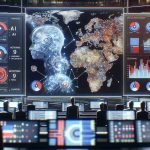A recent study conducted by Duke University alongside the Atlanta and Richmond Federal Reserve banks revealed that a significant portion of businesses, specifically 32%, intends to integrate artificial intelligence into their operations within the coming year. During the first half of 2024, nearly 60% of firms—an impressive 84% of which are large corporations—reported implementing technology designed to automate tasks previously handled by their workforce.
While certain job functions may face challenges due to the swift advancement of AI tools, this transformation is also paving the way for the creation of specialized roles. Positions like AI ethics specialists and AI prompt engineers are expected to become essential in many organizations around the globe.
Furthermore, research from IDC suggests that roles requiring strong human emotional intelligence, such as nursing and jobs that involve ethical decision-making, will continue to thrive despite technological advancements. The inquiry into whether AI could render certain jobs obsolete raises valid concerns; however, industry experts emphasize that some positions will remain secure due to the unique skills and understanding humans bring to the table.
As AI technology evolves, it not only shifts existing job landscapes but also encourages the development of new career paths, illustrating a dynamic response in the workforce to the integration of advanced technologies.
Emerging Job Roles in the Age of AI: Opportunities and Challenges
As artificial intelligence (AI) technologies continue to evolve, a wave of new job roles is emerging in the modern workplace. These roles not only address the needs of businesses seeking to adapt to AI integration but also respond to the complexities and ethical dilemmas posed by the technology.
What New Job Roles Are Emerging?
New positions are rapidly being created due to the advent of AI. Beyond AI ethics specialists and AI prompt engineers, we see roles such as data detectives, responsible for verifying the integrity and accuracy of data fed into AI systems. Additionally, AI trainer roles are becoming crucial, where individuals help train AI systems through supervised learning, correcting outputs to ensure reliability. Another area gaining traction is the position of AI augmenters, who work alongside AI systems to enhance productivity in roles like marketing and customer service.
What Are the Main Challenges and Controversies?
The integration of AI into the workforce presents several challenges. One major concern is job displacement. While some roles are growing, others may become obsolete, leading to shifts in workforce dynamics. Controversy arises around the ethical implications of AI decision-making, particularly in areas like criminal justice and hiring processes, where biases in AI programming can lead to unfair outcomes.
Another critical issue is the digital divide. As companies adopt AI technologies, there is a risk that workers lacking digital skills could be left behind. Training and reskilling initiatives are essential to ensure that all individuals can participate in the AI-driven economy.
Advantages of Emerging AI Roles
The growth of AI-related job roles presents numerous advantages:
– Increased Efficiency: AI can handle repetitive tasks, allowing human workers to focus on more creative and strategic endeavors.
– Higher Pay Potential: Many tech-driven positions command higher salaries due to the specialized skills required.
– New Industries: The growth of AI will foster the development of entirely new industries, offering more opportunities for employment.
Disadvantages and Risks
However, the shift does have its disadvantages:
– Job Displacement: As machines take over certain functions, there exists a real fear of job loss across various sectors.
– Skill Gaps: A lack of access to education or training can create significant skill gaps in the workforce.
– Ethical Concerns: The deployment of AI raises ethical questions about privacy, surveillance, and autonomy.
Are Certain Sectors More Affected by AI?
Yes, sectors such as manufacturing, retail, and customer service are undergoing significant transformations due to AI. Conversely, fields that require high emotional intelligence, critical thinking, and ethical judgment, like healthcare and creative industries, are expected to remain relatively resilient.
Conclusion
As the landscape of work continues to evolve with the rising influence of AI, it’s clear that while challenges exist, so do opportunities. By proactively addressing skill gaps and ethical concerns, society can harness the potential of AI to create a more productive, inclusive, and innovative workforce.
For further insights into the future of work and the impact of AI on job roles, visit Owbusiness for valuable resources and information.

















